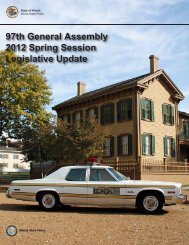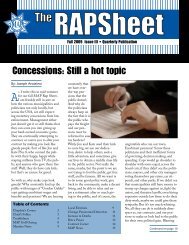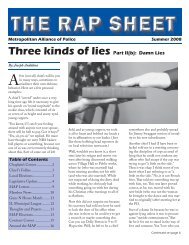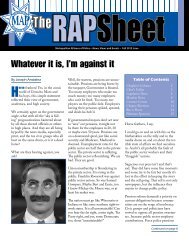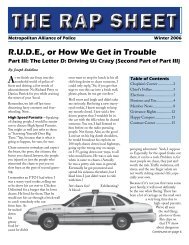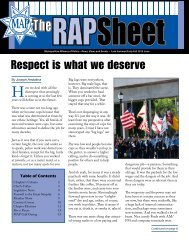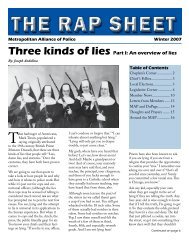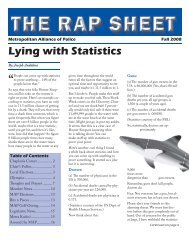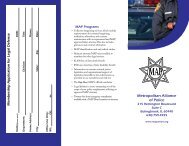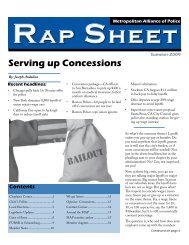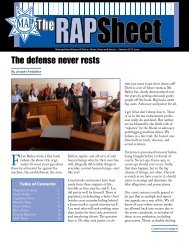To Define or Not to Define - Metropolitan Alliance of Police
To Define or Not to Define - Metropolitan Alliance of Police
To Define or Not to Define - Metropolitan Alliance of Police
You also want an ePaper? Increase the reach of your titles
YUMPU automatically turns print PDFs into web optimized ePapers that Google loves.
Case Law Review<br />
Continued from page 12<br />
between the parties since the PPF had<br />
not yet made a determination as <strong>to</strong> what<br />
the salary was and no final appealable<br />
decision by the PPF had been made. Sedlock<br />
filed a motion <strong>to</strong> strike the PPF’s<br />
motion <strong>to</strong> dismiss.<br />
A hearing was held on both motions,<br />
and on May 31, 2005, the court denied<br />
Sedlock’s motion <strong>to</strong> strike and granted<br />
the PPF’s motion <strong>to</strong> dismiss. First, the<br />
court found that it is the PPF’s fiduciary<br />
duty <strong>to</strong> determine a police <strong>of</strong>ficer’s salary<br />
when calculating his pension. Then, the<br />
court found that dismissal was appropriate<br />
because Sedlock was required <strong>to</strong><br />
exhaust his administrative remedies relief<br />
in court.<br />
Issues: The Appellate Court had two<br />
issues <strong>to</strong> resolve. First, whether the PPF<br />
has the auth<strong>or</strong>ity <strong>to</strong> determine what a<br />
police <strong>of</strong>ficer’s “salary” is under the Code<br />
f<strong>or</strong> the purpose <strong>of</strong> calculating the <strong>of</strong>ficer’s<br />
pension benefit amount. The second<br />
is whether, after having answered the<br />
preceding question in the affirmative, the<br />
trial court properly dismissed the declarat<strong>or</strong>y<br />
judgment action f<strong>or</strong> the lack <strong>of</strong><br />
subject matter jurisdiction.<br />
Holding: The Appellate Court affirmed<br />
the Circuit Court’s decision.<br />
Analysis: The following is the reasoning<br />
behind their decision in affirming<br />
the Circuit Court’s decision. First, they<br />
addressed whether the court had jurisdiction<br />
<strong>to</strong> decide whether the PPF has the<br />
auth<strong>or</strong>ity <strong>to</strong> determine Sedlock’s salary.<br />
Generally, a person with a claim from an<br />
administrative agency must exhaust his<br />
administrative remedies bef<strong>or</strong>e seeking<br />
relief from the judicial system pursuant <strong>to</strong><br />
the Illinois Administrative Review Law.<br />
735 ILCS 5/3-101. However, the court<br />
has recognized several exceptions <strong>to</strong> the<br />
doctrine <strong>of</strong> exhaustion <strong>of</strong> administrative<br />
remedies, including when the agency’s<br />
jurisdiction is attacked because a party<br />
claims that it is not auth<strong>or</strong>ized by statute<br />
<strong>to</strong> do something it is attempting <strong>to</strong> do,<br />
as Sedlock claims here. Where an administrative<br />
assertion <strong>of</strong> auth<strong>or</strong>ity <strong>to</strong> hear <strong>or</strong><br />
determine certain matters is challenged<br />
on its face as not auth<strong>or</strong>ized by the<br />
enabling legislation, such a facial attack<br />
does not implicate the exhaustion doctrine<br />
and exhaustion is not required. The<br />
rationalization exception is that when<br />
an agency’s statut<strong>or</strong>y auth<strong>or</strong>ity <strong>to</strong> exercise<br />
jurisdiction is at issue, no questions<br />
<strong>of</strong> fact are involved. Theref<strong>or</strong>e, the trial<br />
court had jurisdiction <strong>to</strong> decide whether<br />
the PPF had the auth<strong>or</strong>ity <strong>to</strong> determine<br />
Sedlock’s salary f<strong>or</strong> the purpose <strong>of</strong> calculating<br />
his pension under the Code.<br />
Next, the Appellate Court considered<br />
whether the PPF has the auth<strong>or</strong>ity <strong>to</strong><br />
determine Sedlock’s “salary.” The Appellate<br />
Court agreed with the trial court’s<br />
statut<strong>or</strong>y interpretation that the PPF<br />
has the auth<strong>or</strong>ity <strong>to</strong> determine what<br />
Sedlock’s salary is under the Code f<strong>or</strong> the<br />
purpose <strong>of</strong> calculating his future pension.<br />
Section 3-132 <strong>of</strong> the Code provides that,<br />
pursuant <strong>to</strong> section 3-131, police pension<br />
fund boards have the exclusive control<br />
and management <strong>of</strong> the pension fund.<br />
40 ILCS 5/3-132. The Fundamental<br />
purpose <strong>of</strong> a police pension fund board is<br />
<strong>to</strong> determine eligibility <strong>to</strong> participate in<br />
the fund. Additionally, the trustees <strong>of</strong> the<br />
fund are statut<strong>or</strong>ily designated as fiduciaries.<br />
As a fiduciary, each board member<br />
is required <strong>to</strong> “discharge his <strong>or</strong> her duties<br />
with respect <strong>to</strong> the pension fund solely in<br />
the interest <strong>of</strong> the participants and beneficiaries<br />
and f<strong>or</strong> the exclusive purpose<br />
<strong>of</strong> providing benefits <strong>to</strong> participants and<br />
their beneficiaries. 40 ILCS 5/1-109. The<br />
court went on <strong>to</strong> hold that the board’s<br />
statut<strong>or</strong>y duties include determining<br />
what Sedlock’s annual salary should be<br />
f<strong>or</strong> the purpose <strong>of</strong> calculating his retirement<br />
benefits. Granting Sedlock’s request<br />
could result in circuit courts being<br />
charged with making salary determinations<br />
f<strong>or</strong> thousands <strong>of</strong> public employees<br />
seeking disability <strong>or</strong> retirement pensions<br />
each year. This is not what the legislature<br />
intended. The board is in the best position<br />
<strong>to</strong> determine whether Sedlock’s most<br />
recent salary included overtime, holiday,<br />
bonus, <strong>or</strong> merit pay.<br />
Next, the Appellate Court considered<br />
whether the court properly dismissed<br />
the complaint f<strong>or</strong> declarat<strong>or</strong>y judgment.<br />
Once the court properly determined the<br />
scope <strong>of</strong> the PPF’s auth<strong>or</strong>ity, there was<br />
no actual controversy between the parties<br />
since there had been no determination by<br />
the PPF as <strong>to</strong> what the salary <strong>of</strong> Sedlock<br />
was <strong>or</strong> what his retirement pension will<br />
be. Under section 3-128 <strong>of</strong> the Code,<br />
all final administrative decisions <strong>of</strong> the<br />
pension board are judicially reviewable<br />
under the provisions <strong>of</strong> the Administrative<br />
Review Law. 40 ILCS 5/3-128. Until<br />
there is a final appealable decision by the<br />
PPF, any action brought bef<strong>or</strong>e the court<br />
is premature and the court does not have<br />
subject matter jurisdiction. Judicial review<br />
can only be undertaken where there is<br />
final agency determination.. Without a<br />
final decision from PPF, there is simply<br />
nothing f<strong>or</strong> the circuit court <strong>to</strong> review.<br />
The Appellate court held that the Circuit<br />
Court c<strong>or</strong>rectly determined that it had no<br />
subject matter jurisdiction on the issue<br />
<strong>of</strong> what Sedlock’s salary should be. The<br />
judgment <strong>of</strong> the circuit court <strong>of</strong> LaSalle<br />
County was affirmed.<br />
Quote:<br />
With money in your pocket, you are wise<br />
and you are handsome, and you sing well,<br />
<strong>to</strong>o.<br />
—Jewish proverb<br />
Page 14 The Rap Sheet Spring 2007



